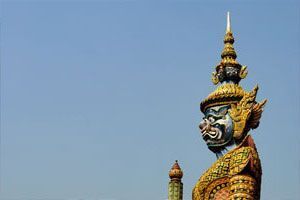
Engaging the Isaan for Jesus
Arnie and the Isaan
Maha Sarakham is a large educational hub in Thailand, hosting 70-80,000 students between the 6 universities and colleges present in the city. Many of the students who have come to Maha Sarakham to study are from the Isaan people group – an unreached, Buddhist people who have historically made a life for themselves working the land and living off the fruit of their fields.
Wander into the Faculty of Pharmacy in one of the main universities and you’ll find Arnie. Arnie is one member of the three-person SEND team, which has set its sights on reaching the Isaan people for Christ. A team that is only about a year and a half old, its members are diligently studying Thai and learning the ins and outs of the Isaan culture.
Who are the Isaan?
There are 22 million Isaan people, comprising 32% of the Thai population, located primarily in the North East. Originally from Laos, the Isaan were forcibly relocated and have over time come to identify themselves as Thai, although they have a distinct language, diet, rituals and culture. They are a friendly people, with a strong sense of family and community.
As Buddhists, many Isaan people spend their lives seeking to eliminate suffering and improve their future through attaining merit in their present existence. Merit is sought through feeding monks, donating to temples and worshipping in temples.
Working among the Isaan
When Arnie isn’t studying Thai, Arnie is eating lunch with Isaan students, helping them practice their English and leading Bible studies when asked. Because most Isaan are dedicated Buddhists, traditional evangelism is difficult and often, unfruitful. The difficulty is increased as the Isaan know that if they choose to follow Christ, they can be sure to be ostracized by their community – a value they hold dear. The Isan team has taken the approach of building friendships and trust to use as a foundation for evangelism through discipleship – the ministry of "hanging out".

While the ministry of "hanging out" sounds enjoyable and fun, it isn’t without its challenges. Arnie has to remind herself often to be patient and flexible, finding that many of the students will change their plans on a whim and forget to inform her. Sometimes this means that students will show up late for appointments and sometimes it means they don’t show up at all.
Praying for Fruit
Although this is a new ministry, Arnie has already had the privilege of discipling two girls. She has been encouraged to see them grow in their faith as they study the Bible, faithfully attend church and have their own quiet time each day. A small group of students have asked for an English Bible study and Arnie looks forward to digging into the Word with them and seeing how the Holy Spirit moves.
As the Isaan team members diligently study Thai and befriend students in Maha Sarakham, pray that they would have wisdom in sharing the gospel in ways that challenge the Isaan worldview – opening their eyes to see that there is a loving, living God who has paid the price for their sin, because the merit they seek to earn in this life will never be enough on its own.
Pray for new team members to join the efforts to love and lead the Isaan to saving faith! Pray for courage for Isaan believers to speak out and be bold in sharing their faith. Pray that the Holy Spirit would be softening the hearts of the Isaan, preparing them to hear and understand God’s good news!
Additional Posts




